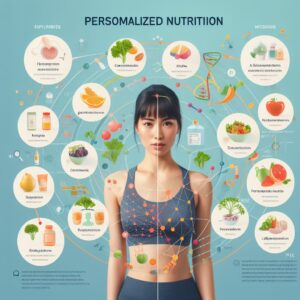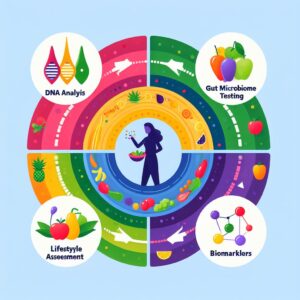Concept of personalized nutrition
Personalized nutrition, also known as precision nutrition, is an emerging field that focuses on tailoring dietary recommendations to an individual’s unique genetic makeup, lifestyle factors, and health goals. This approach to nutrition is based on the understanding that each person’s body responds differently to different foods and nutrients and that a one-size-fits-all approach to nutrition is no longer sufficient to achieve optimal health.
One of the key components of personalized nutrition is genetic testing. By analyzing a person’s DNA, it is possible to identify genetic variants that may influence their metabolism, nutrient absorption, and risk of developing certain health conditions. This information can then be used to create a personalized diet plan that is optimized for that individual’s needs.
Lifestyle factors also play a significant role in personalized nutrition. For example, a person who is physically active may have different dietary needs than someone who is sedentary. Additionally, individuals with certain health conditions, such as diabetes or heart disease, may need to make specific dietary modifications to manage their condition.
The goal of personalized nutrition is to help people achieve their individual health goals, whether it is losing weight, improving their energy levels, or reducing their risk of chronic disease. By taking into account a person’s unique genetic makeup, lifestyle factors, and health goals, personalized nutrition can provide a more effective and sustainable approach to achieving optimal health.

Benefits of Personalized Nutrition
- Improved nutrient absorption and metabolism
- Reduced risk of chronic diseases
- Enhanced weight management
- Increased energy levels
- Improved mood and cognitive function
- Reduced inflammation
- Stronger immune system
- Personalized dietary recommendations that are easy to follow and maintain
How to Get Started with Personalized Nutrition
If you are interested in learning more about personalized nutrition, there are a few things you can do:
- Talk to your doctor or a registered dietitian.
- Get a personalized nutrition test kit.
- Use a personalized nutrition app or website.
By taking the first step towards personalized nutrition, you can embark on a journey to achieving your optimal health and wellness.
Personalized nutrition is still a relatively new field, but it has the potential to revolutionize the way we think about food and nutrition. By taking a personalized approach to nutrition, we can all make informed choices about the foods we eat and ultimately live healthier, happier lives.
Highlight the significance of tailoring one’s diet to individual needs
Tailoring one’s diet to individual needs, also known as personalized nutrition, is crucial for optimizing overall health and well-being. Each person possesses unique genetic predispositions, lifestyle factors, and health goals that significantly influence their nutritional requirements. Embracing a personalized nutrition approach allows individuals to reap a multitude of benefits, including:
- Enhanced Nutrient Absorption and Metabolism: Personalized nutrition identifies genetic variations that affect nutrient absorption and metabolism, enabling individuals to consume the optimal amounts of specific nutrients for their bodies. This tailored approach ensures that individuals are getting the most out of their food and optimizing their bodily functions.
- Reduced Risk of Chronic Diseases: Genetic predispositions and lifestyle habits can increase the likelihood of developing chronic diseases such as heart disease, diabetes, and obesity. Personalized nutrition helps individuals identify these risks and make proactive dietary changes to mitigate them, reducing their chances of developing these conditions.
- Effective Weight Management: Personalized nutrition considers an individual’s metabolism, activity level, and body composition to create a sustainable weight management plan. This tailored approach addresses the root causes of weight gain or loss, promoting long-term success and preventing yo-yo dieting.
- Increased Energy Levels: Personalized nutrition ensures that individuals are consuming the right amounts of the right nutrients to fuel their bodies effectively. This optimized intake leads to increased energy levels, improved focus, and reduced fatigue, enhancing overall productivity and quality of life.

- Improved Mood and Cognitive Function: Certain nutrients play a critical role in brain health and neurotransmitter function. Personalized nutrition identifies individuals’ needs for these nutrients and ensures adequate intake, contributing to improved mood, reduced stress, and enhanced cognitive function.
- Reduced Inflammation: Chronic inflammation is linked to various health issues, including heart disease, arthritis, and autoimmune disorders. Personalized nutrition helps identify inflammatory triggers and promotes the consumption of anti-inflammatory foods, reducing inflammation and promoting overall well-being.
- Stronger Immune System: A balanced and nutrient-rich diet is essential for a robust immune system. Personalized nutrition ensures that individuals are getting the necessary nutrients to support their immune defenses, making them less susceptible to infections and illnesses.
- Personalized Dietary Recommendations: Personalized nutrition provides tailored dietary recommendations that align with an individual’s unique needs, preferences, and lifestyle. This personalized approach makes it easier to adopt and maintain healthy eating habits, ensuring long-term success.
What is Personalized Nutrition?
Genetics, lifestyle, and health goals play a crucial role in personalized nutrition, as they shape an individual’s unique nutritional requirements and responses to different foods.
Genetics:
An individual’s genetic makeup influences their metabolism, nutrient absorption, and susceptibility to certain health conditions. For instance, genetic variations can affect the body’s ability to process lactose, leading to lactose intolerance. Personalized nutrition takes these genetic predispositions into account, recommending dietary modifications to prevent adverse reactions or nutrient deficiencies.
Lifestyle:
Lifestyle factors, such as physical activity level, occupation, and dietary habits, significantly impact nutritional needs. A physically active individual requires more calories and electrolytes to support their energy demands, while someone with a sedentary lifestyle may need to adjust their calorie intake to prevent weight gain. Personalized nutrition considers these lifestyle factors, providing tailored recommendations that align with an individual’s daily activities.

Health Goals:
Each person’s health goals, whether it’s weight management, improving athletic performance, or managing chronic conditions, influence their nutritional requirements. For example, an individual aiming to lose weight may need a calorie-restricted diet with a focus on nutrient-dense foods, while an athlete may require increased protein and carbohydrate intake to support muscle recovery and energy demands. Personalized nutrition considers these health goals, creating a dietary plan that aligns with an individual’s specific objectives.
By understanding the interplay between genetics, lifestyle, and health goals, personalized nutrition can provide a comprehensive and effective approach to optimizing an individual’s dietary choices. By tailoring recommendations to each person’s unique needs, personalized nutrition empowers individuals to achieve their health goals and maximize their overall well-being.
The Science Behind Personalized Nutrition
Advancements in technology and research have revolutionized the field of personalized nutrition, making it more accessible and effective than ever before. These advancements have enabled the development of innovative tools and strategies that allow individuals to gain a deeper understanding of their unique nutritional needs and make informed dietary choices. Here are some key examples of how technology and research are driving the progress of personalized nutrition:
- Genetic Testing and Analysis:
Genetic testing has become increasingly accessible and affordable, allowing individuals to analyze their DNA and identify genetic variants that may influence their metabolism, nutrient absorption, and risk of developing certain health conditions. This information provides valuable insights for personalized nutrition plans, enabling individuals to tailor their diets to address specific genetic predispositions.
- Nutrition Data and Biomarker Analysis:
Vast amounts of data on nutrition and biomarkers are now available through online databases and research studies. This information, combined with advanced computational tools, allows researchers and healthcare professionals to identify patterns, correlations, and potential interventions related to personalized nutrition.

- Wearable Technology and Dietary Tracking:
Wearable devices, such as fitness trackers and smartwatches, provide real-time data on physical activity, sleep patterns, and dietary intake. This data can be integrated with personalized nutrition plans, allowing individuals to track their progress, identify areas for improvement, and receive personalized feedback.
- Artificial Intelligence and Machine Learning:
Artificial intelligence (AI) and machine learning (ML) algorithms are being developed to analyze large datasets of genetic, lifestyle, and nutritional information. These algorithms can identify complex patterns and relationships, enabling the creation of personalized nutrition recommendations based on an individual’s unique profile.
- Personalized Nutrition Apps and Online Tools:
A growing number of personalized nutrition apps and online tools are available to consumers. These platforms allow individuals to input their genetic information, lifestyle factors, and health goals to receive tailored dietary recommendations, meal plans, and progress-tracking tools.
These advancements in technology and research are making personalized nutrition more accessible by:
- Reducing the cost and complexity of genetic testing and analysis
- Providing easy access to comprehensive nutrition data and tools
- Enabling the development of personalized nutrition apps and online platforms
- Empowering individuals to make informed dietary choices based on their unique needs
As technology continues to evolve, we can expect even more innovative tools and strategies to emerge in the field of personalized nutrition, further empowering individuals to optimize their health and well-being through tailored dietary choices.
Assessing Your Individual Needs
Consulting with healthcare professionals, or dietitians, or using personalized nutrition services is crucial for several reasons:
- Guidance and Support: Healthcare professionals and dietitians have extensive knowledge of nutrition, metabolism, and the impact of food on overall health. They can provide personalized guidance and support to help individuals develop a safe and effective dietary plan that aligns with their specific needs and goals.
- Tailored Recommendations: Healthcare professionals and dietitians can analyze an individual’s medical history, genetic predispositions, lifestyle habits, and health goals to create a tailored nutrition plan that addresses their unique needs. This personalized approach ensures that individuals are receiving the most appropriate and effective dietary recommendations.
- Monitoring and Adjustments: Regular consultations with healthcare professionals and dietitians allow for ongoing monitoring and adjustments of an individual’s dietary plan. This ongoing assessment ensures that the plan remains effective and adapts to any changes in an individual’s health or lifestyle.

- Addressing Specific Health Conditions: Healthcare professionals and dietitians can provide specialized advice and recommendations for individuals with specific health conditions, such as diabetes, heart disease, or digestive disorders. Their expertise can help manage symptoms, reduce the risk of complications, and improve overall health outcomes.
- Personalized Nutrition Services: Personalized nutrition services offer comprehensive assessments that combine genetic testing, lifestyle analysis, and health goal evaluation to create individualized dietary plans. These services provide a detailed and data-driven approach to personalized nutrition.
Consulting with healthcare professionals, or dietitians, or using personalized nutrition services can be particularly beneficial for:
- Individuals with chronic health conditions: Tailored nutrition plans can help manage symptoms, improve disease control, and reduce the risk of complications.
- Individuals with allergies or intolerances: Healthcare professionals and dietitians can identify potential triggers and develop safe and effective elimination diets.
- Individuals seeking weight management or body composition changes: Personalized nutrition plans can support healthy and sustainable weight loss or body composition goals.
- Individuals with athletes or fitness enthusiasts: Tailored nutrition plans can optimize performance, enhance recovery, and support specific training goals.
- Individuals with general health and wellness goals: Personalized nutrition plans can provide a roadmap for achieving overall well-being and optimizing health through diet.
Tailoring Your Plate: Practical Tips
Personalizing your diet can be a rewarding and effective way to improve your overall health and well-being. Here are some practical tips to get you started:
- Track your food and beverage intake: Keep a food diary for a few days to track what you eat and drink. This will help you identify patterns, potential nutrient deficiencies, and areas for improvement.
- Identify your health goals: What do you hope to achieve by personalizing your diet? Are you looking to lose weight, improve your energy levels, manage a chronic condition, or boost your overall health?
- Consider your lifestyle and preferences: What are your typical eating habits? Do you have any food allergies or sensitivities? What are your favorite cuisines and cooking methods?

- Consult with a healthcare professional or dietitian: If you have any underlying health conditions or concerns, seeking guidance from a healthcare professional or dietitian can help you develop a safe and personalized plan.
- Make gradual changes: Don’t try to overhaul your entire diet overnight. Start by making small, sustainable changes, such as swapping out processed snacks for fresh fruits or vegetables or incorporating more protein-rich foods into your meals.
- Prioritize nutrient-dense foods: Focus on consuming whole, unprocessed foods that are rich in vitamins, minerals, fiber, and phytonutrients. These foods provide essential nutrients for optimal health and well-being.
- Cook more meals at home: Cooking at home allows you to control the ingredients and portion sizes, ensuring you’re consuming a healthy and balanced diet.
- Be mindful of portion sizes: Even healthy foods can contribute to weight gain or nutrient imbalances if consumed in excessive amounts. Pay attention to portion sizes and use tools like measuring cups and spoons to gauge appropriate amounts.
- Stay hydrated: Water is essential for overall health and plays a crucial role in nutrient absorption and metabolism. Aim to drink plenty of water throughout the day to stay hydrated and support your body’s functions.
- Make personalized nutrition a lifestyle: Personalizing your diet is not a temporary fix but an ongoing journey toward optimal health. Continuously evaluate your nutritional needs, make adjustments as needed, and enjoy the benefits of a healthy and personalized eating pattern.
Remember, personalizing your diet is a journey, not a race. Take it slow, make sustainable changes, and enjoy the process of discovering what works best for your body and your unique needs.
Success Stories and Testimonials
Personalized nutrition has helped many individuals improve their overall health and well-being. Here are a few success stories and testimonials:

- Sarah, a 35-year-old woman with type 2 diabetes:
Before personalized nutrition, Sarah struggled to manage her blood sugar levels and had frequent episodes of hypoglycemia. After working with a dietitian, she developed a personalized meal plan that incorporated low-glycemic-index foods and balanced her carbohydrate intake. As a result, Sarah’s blood sugar levels stabilized, and she no longer experiences hypoglycemia.
- David, a 45-year-old man with high cholesterol:
David’s cholesterol levels had been consistently high despite taking medication. After undergoing genetic testing, he discovered a predisposition to high cholesterol. His doctor recommended a personalized diet that focused on heart-healthy fats, fiber-rich foods, and limited processed foods. David’s cholesterol levels significantly improved, and he was able to reduce his medication dosage.
- Emily, a 28-year-old woman with chronic fatigue:
Emily had been experiencing persistent fatigue for several months and had difficulty concentrating and maintaining energy levels. Through personalized nutrition, she identified food sensitivities and nutrient deficiencies that were contributing to her fatigue. By eliminating trigger foods and incorporating essential nutrients into her diet, Emily’s energy levels improved, and her overall sense of well-being enhanced.
- John, a 50-year-old man seeking weight loss and improved athletic performance:
John had been trying to lose weight for several years but had struggled with consistent progress. With personalized nutrition, he discovered that his metabolism was more sensitive to carbohydrate intake than he previously thought. By adjusting his macronutrient balance and incorporating more protein and fiber-rich foods, John finally achieved sustainable weight loss and improved his athletic performance.
- Mary, a 65-year-old woman seeking to maintain bone health and prevent osteoporosis:
Mary was concerned about her risk of osteoporosis and wanted to take proactive measures to maintain bone health. Through personalized nutrition, she learned that her diet lacked adequate calcium and vitamin D, essential nutrients for bone health. By incorporating calcium-rich foods and vitamin D supplements, Mary was able to optimize her nutrient intake and support her bone health.
These success stories demonstrate the effectiveness of personalized nutrition in addressing various health concerns and improving overall well-being. By tailoring dietary recommendations to individual needs and preferences, personalized nutrition empowers individuals to make informed choices that optimize their health and achieve their wellness goals.
Challenges and Considerations
Personalized nutrition, while offering a promising approach to optimizing health and well-being, also presents potential challenges and misconceptions that need to be addressed:
- Cost and Availability: Personalized nutrition services and genetic testing can be expensive, limiting accessibility for individuals with limited financial resources. Additionally, not all healthcare providers or dietitians are fully equipped to provide personalized nutrition counseling, making it challenging to find qualified professionals in certain regions.
- Misconceptions and Oversimplification: Personalized nutrition is often portrayed as a quick fix or a magic bullet for weight loss or health improvement. However, it’s important to understand that personalized nutrition is a journey, not a destination. It requires ongoing adjustments, lifestyle changes, and commitment to achieve sustainable results.

- Individual Variability and Response: Every individual responds differently to dietary interventions, making it challenging to predict with absolute certainty the outcome of personalized nutrition plans. Factors such as gut microbiome composition, stress levels, and medication use can influence individual responses.
- Overreliance on Technology: While technology plays a valuable role in personalized nutrition, it’s crucial to not solely rely on genetic testing or algorithms to dictate dietary choices. A comprehensive approach that considers an individual’s overall health, lifestyle, and preferences is essential for effective personalized nutrition.
- Sustainability and Long-Term Adherence: Personalized nutrition plans can be complex and require significant changes in eating habits. Maintaining these changes over time can be challenging, and individuals may experience setbacks or struggle with long-term adherence.
- Focus on Weight Loss or Limited Scope: Some approaches to personalized nutrition may focus primarily on weight loss, overlooking other important aspects of health and well-being. A comprehensive personalized nutrition plan should address overall health goals, including nutrient deficiencies, chronic disease management, and overall well-being.
- Communication and Collaboration: Effective communication between healthcare professionals, dietitians, and individuals is crucial for successful personalized nutrition. Clear explanations of test results, personalized recommendations, and ongoing monitoring are essential for informed decision-making and adherence.
- Regulatory Framework and Standards: Personalized nutrition is a relatively new field, and there is a lack of standardized regulations or guidelines for its implementation. This can lead to inconsistencies in the quality and effectiveness of personalized nutrition services.
- Integration into Healthcare Systems: Personalized nutrition is not yet fully integrated into mainstream healthcare systems, making it challenging for individuals to access these services through their primary care providers. Wider integration would increase accessibility and promote personalized nutrition as an integral part of preventive care.
- Continuous Research and Education: Ongoing research is needed to further understand the complex interactions between genetics, lifestyle, and nutrition. Additionally, education and training for healthcare professionals and dietitians are crucial to ensure they are equipped to provide personalized nutrition counseling effectively.
Addressing these challenges and misconceptions will help ensure that personalized nutrition is a well-informed, accessible, and effective approach to optimizing health and well-being for a wider population.
Personalized nutrition is a revolutionary approach to health and wellness that focuses on tailoring dietary recommendations to an individual’s unique genetic makeup, lifestyle factors, and health goals. This approach has gained popularity due to its potential to address various health concerns and improve overall well-being.
Conclusion:
- Personalized nutrition offers a more effective and sustainable approach to achieving optimal health compared to one-size-fits-all dietary recommendations.
- Factors such as genetics, lifestyle, and health goals play a crucial role in determining an individual’s nutritional needs and responses to different foods.
- Advancements in technology and research, such as genetic testing, nutrition data analysis, and wearable technology, are making personalized nutrition more accessible and effective.
- Consulting with healthcare professionals, and dietitians, or using personalized nutrition services can provide valuable guidance and support for developing a safe and personalized dietary plan.
- Practical tips for starting to personalize your diet include tracking your food intake, identifying your health goals, consulting with a professional, making gradual changes, prioritizing nutrient-dense foods, cooking more meals at home, staying hydrated, and making personalized nutrition a lifestyle.
- Success stories demonstrate the effectiveness of personalized nutrition in addressing various health concerns, such as diabetes, high cholesterol, chronic fatigue, weight loss, and bone health.
Potential challenges of personalized nutrition include cost and availability, misconceptions, individual variability, overreliance on technology, sustainability, limited scope, communication, regulatory framework, integration into healthcare systems, and the need for continuous research and education.
Read more articles about Health and Hygiene:-


